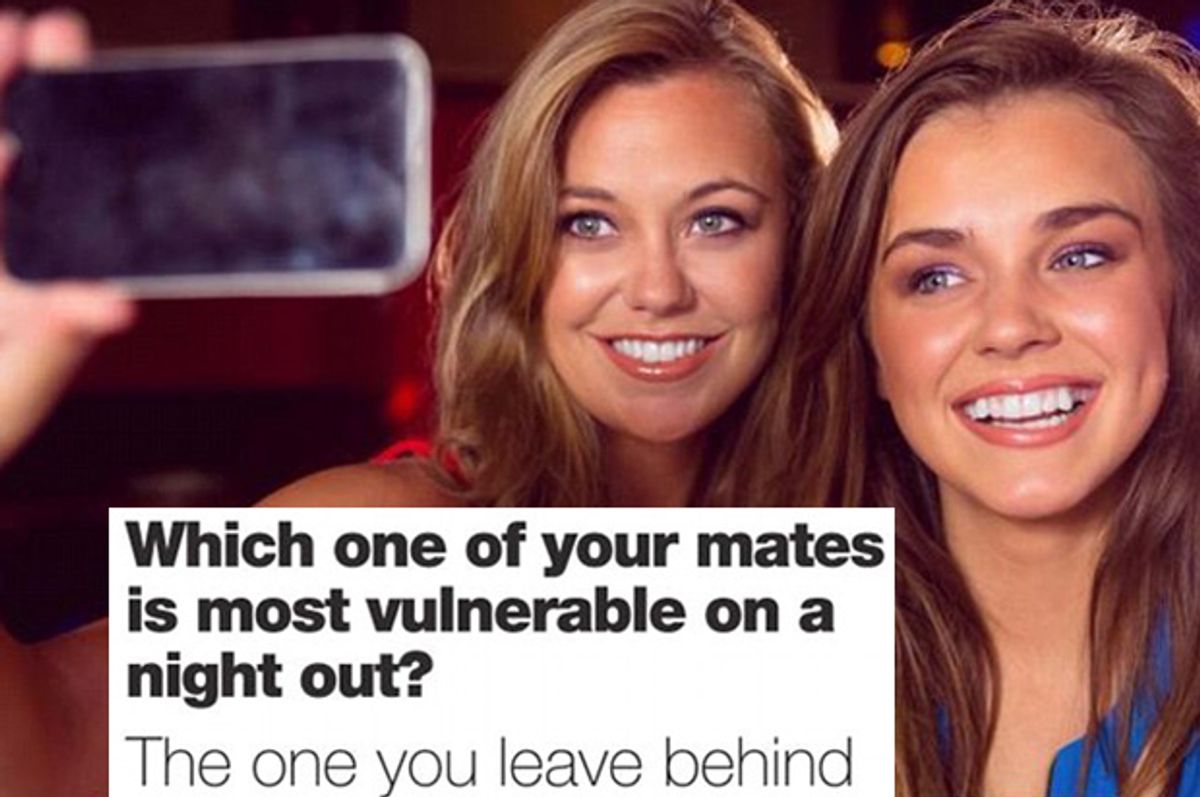If there's any small measure of good news to come out of the Rolling Stone UVA fiasco — as well as multiple other high profile recent stories about sexual assault — it's that we're now having more open and nuanced conversations about rape, and rape prevention. The bad news is that a lot of those conversations are just wrong and dumb.
Take, for instance, a new British summer safety campaign that's drawing strong reactions for what critics say is a message that carries a strong implication of victim blaming. In an ad, two smiling young women taking a selfie appear with the message, "Which one of your mates is most vulnerable on a night out? Many sexual assaults could be prevented. Stick together and don’t let your friend leave with a stranger or go off on their own." Because you might be responsible for your buddy being raped.
There's nothing wrong with friends looking out for each other, especially in environments that involve drinking. Last year, the White House's It's On Us campaign explored a similar theme, with a PSA that showed a young man at a party "being the guy who stops" a sexual assault — by stepping up when a seemingly inebriated girl is shepherded off by a potential assailant. And as Katie Russell, spokeswoman for Rape Crisis, explains to The Independent, "It’s not unreasonable for the police to advise this." But, she adds, "Those with the real power to prevent sexual assaults in significant numbers, however, are not friends and bystanders but those who have sole responsibility for these terrible crimes – that is, the perpetrators." And Laura Bates of Everyday Sexism notes, "Focusing on victim behavior prevents us from placing the blame where it belongs- with the perpetrator alone."
And that's the problem. If you want to bring about serious and lasting change, you can't stick with the old "Ladies, beware!" script. To do so only continues to perpetuate the unhelpful notion that stopping sexual assault is women's work — and that when rape happens, it's women's fault. Contrast the Sussex police's message with a Manchester campaign that ran last year that reminded, "Drinking is not a Crime. Rape is." It went on to explain that "Sex without consent is rape." See the difference?
Which brings us to our next ill-advised message. All this week, Elle has been devoting its attention to the subject of "love and lust in the age of consent," and on Wednesday it published a doozy of a feature by Cristina Nehring. In the story, which also appears in the April print issue of the magazine, Nehring describes an episode while abroad in college, when she, "giddy from a goodly amount of rosé," went home with her date. She fell asleep with him next to her in his tiny bed, and then in the morning, "His caresses explored, were eluded, slowed, circled, soothed, revived, roamed. Dawn broke slowly, and my defenses with it." It's a romantic memory of a man she went on to have a long relationship with. But, she says, "Were it today and in the U.S., our first time together could readily be considered 'rape.'"
She then goes on to examine California's hot button affirmative consent law, including its mention of complainants "unable to communicate because of a mental or physical condition." She argues, "It's hard not to wonder what other mental conditions the legislators may have in mind. Infatuation, perhaps? Love, as biologists, neurologists, and poets have all attested, is a notoriously mind-altering condition, and thus, under California law, someone in love should never make any sexual decisions at all." Are you frigging kidding me?
The whole thing's a long, frustrating read, especially coming from a woman who in the same piece describes being raped at knifepoint by a family friend as a young girl. "A culture that conflates my suburban rapist and seducing Frenchman is a culture that is fundamentally confused," she writes. I'm sorry, but who's doing that? Because I truly don't know any reasonable person who would suggest her pleasurable, consensual encounter with her Parisian admirer was an assault. Yet she goes on to say, "In our safety-checked and responsible culture, in our endlessly chattering, texting, blogging, brown-nosing, apologizing, analyzing, verbalizing culture, eroticism may be the last frontier we can explore intuitively. Like dance, sexuality is at once preverbal and transverbal: It predates the word and outstrips it. To pin it down with questions and formulas is like pinning a butterfly to a wall. You can see it better there, but it no longer flutters. And neither, in all likelihood, does your heart." For the real kicker, she announces, "For when everyone is a rape victim, no one is a rape victim." So I guess the good news is that we've apparently eradicated rape, albeit in a roundabout way.
Believe it or not, you can believe in being responsible, in avoiding high risk behavior, in advocating for yourself and your friends, and in the subtle nuances of sexual communication, all without being what Nehring calls a "rape alarmist." Very few of us are advocating for "brightly lit airstrips, big arrows, wide landing lanes" here, or demanding that every erotic encounter begin with a signed contract. "Regret is not the same thing as being victimized," she writes. Yes, plenty of us know that, thanks. The pernicious argument that women routinely cry rape when they really just feel regret clouds the very real problems of how sexual assault survivors are still far too often doubted and dismissed and marginalized. And communication and consent are absolutely zero threat to healthy, hot sex. In fact, they're essential to it.



Shares